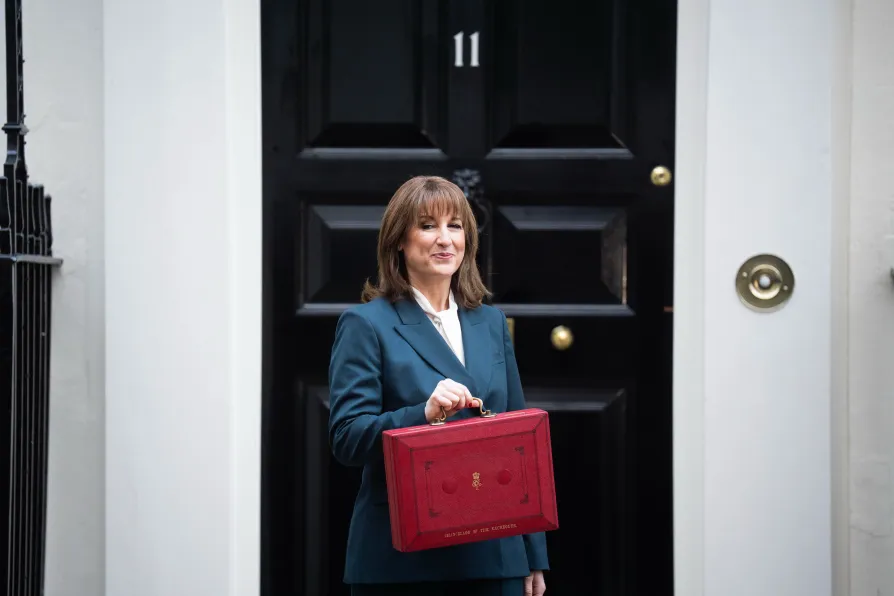
 Chancellor of the Exchequer Rachel Reeves poses outside 11 Downing Street, London, with her ministerial red box, before delivering her Budget in the House of Commons, November 26, 2025
Chancellor of the Exchequer Rachel Reeves poses outside 11 Downing Street, London, with her ministerial red box, before delivering her Budget in the House of Commons, November 26, 2025
LABOUR is under pressure from the left. The biggest step forward in its Budget — the abolition of the two-child benefit cap — is the result of this, as well as fear of its own backbenchers after the July revolt against disability cuts.
Awareness that the cost of living remains people’s biggest concern motivates Chancellor Rachel Reeves’s modest intervention to bring energy bills down, and signifying she is ready to confront the better off — a restive Parliamentary Labour Party is fed up of “tough choices” always hurting those with least — the surcharges on multimillion-pound houses.
Tory leader Kemi Badenoch, jeering that Labour should rename itself the “welfare party” for its recklessness with taxpayer funds, might seem a voice crying in the wilderness.
The Tories are down and maybe even out — but the pollsters’ frontrunner Reform UK is another party dedicated to slashing taxes and cutting social security (including pensions). Not because of these policies — it barely mentions them in comparison to its constant scaremongering over immigration.
But the left still needs to cut through on taxation and public spending. And that means calling out a Budget which remains dangerously regressive on it.
With the total tax take set to rise to 38 per cent of GDP by 2030-31, the highest in decades, the left will struggle if we are caricatured as constantly demanding higher taxes. The argument needs to be shifted. Who does the money come from? And who does it go to?
On the former, extending the freeze on tax band and National Insurance thresholds is an attack on working-class people’s take-home pay. This has been done three years on the trot and is now due to last another six. As the bands aren’t moving with inflation, more lower earners are paying more tax on more of their incomes — for median earners already well over £100 a month more compared to the start of the decade.
The tax burden is being shifted downwards — and for what? Reeves says the freeze will raise £7.6 billion a year by 2030.
How much a wealth tax — all forms of which she continues to reject — would raise depends on which model is adopted, but the 2 per cent tax on assets in excess of £10 million proposed in an early day motion from Socialist Campaign Group of MPs secretary Richard Burgon is estimated to bring in £24bn a year.
The right’s claim that Britain is carrying an unaffordable tax burden, and so needs to cut welfare and services, will gain traction unless the left is clear about what we need to tax — wealth, land, unearned income (through rents and dividends) and profits particularly.
That also means being clearer on the fact that a threshold freeze is a tax rise on ordinary people. Too often the left ignores these “stealth taxes,” but they contribute significantly to the squeeze on household budgets.
If that continues, then limited interventions like that on energy (predicted to cut typical bills by about £150 a year, when annual bills have risen by nearly £800 since 2021) will not address the cost-of-living crisis and Labour will continue to sink.
Nor, without the bigger policy shifts called for by much of the labour movement — including restoration of public ownership of utilities, and removal of profiteering from public services — can we stop rip-off merchants fleecing us at every turn, both as consumers and taxpayers.
The key to reversing the decline of working-class living standards is public ownership and control. It will not be found in fawning on transnational corporations, or — to take the Lib Dem suggestion — greater alignment with the European Union, whose major economies are just as sick as Britain’s.
If Labour can be budged — and the Budget suggests it can — then we need to up the pressure for a comprehensive change of direction, not thank it for the odd sticking plaster.










